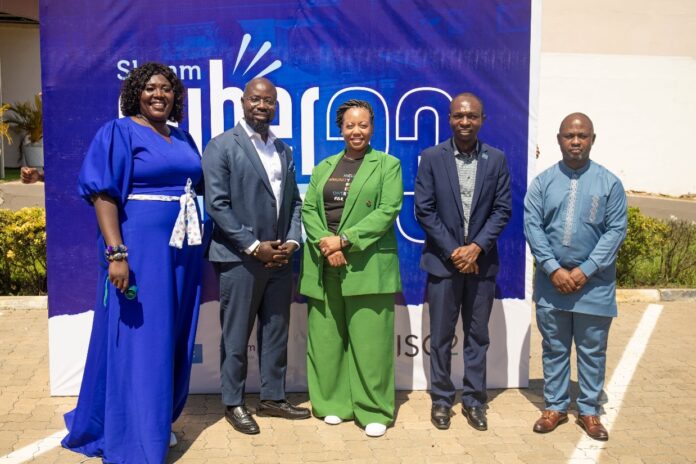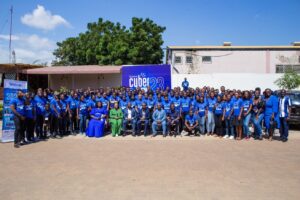
… as Slamm Foundation, ISC2 trains over 300 for free in Accra and Kumasi
Director General of the Cyber Security Authority (CSA), Dr. Albert Antwi-Boasiako, has urged information and communications technology (ICT) professionals to leverage their skills to catalyse the economic transformation of Ghana.
In a speech read on his behalf by Alex Oppong, Acting Director in charge of Capacity Building and Awareness Creation at the CSA, Dr. Antwi-Boasiako’s call to action came during the graduation ceremony of a free cybersecurity training programme organised by Slamm Foundation, the Corporate Social Responsibility (CSR) arm of Slamm Technologies, in partnership with ISC2.
He underscored the vital role of ICT professionals in bolstering Ghana’s cybersecurity landscape and driving national economic prosperity. More than 300 young Ghanaians in Accra and Kumasi benefitted from the free three-day training programme.
Already, the International Finance Corporation (IFC) has projected that by 2030 more than 230 million jobs in sub-Saharan Africa will necessitate digital proficiency, offering nearly 650 million chances for training as there exists a substantial opportunity worth approximately US$130billion to impart digital skills throughout sub-Saharan Africa until 2030 – with nearly US$4billion of this opportunity concentrated in Ghana.
This demand for digital expertise in sub-Saharan Africa, including Ghana, is being driven by both burgeoning economic expansion and the increasing digitisation and automation of sectors like agriculture, manufacturing and services. The most significant prospects lie in business-to-business and business-to-government training, primarily targetting basic and intermediate skills. Nevertheless, there are also noteworthy opportunities in business-to-consumer training, particularly for intermediate and advanced skill levels.

Consequently, Dr. Antwi-Boasiako praised the collaboration between the Slamm Foundation and ISC2, emphasising the importance of such initiatives in the digital age. “In today’s interconnected world, cybersecurity is a critical component of our national security and economic growth. ICT professionals play a pivotal role in safeguarding our digital infrastructure. I encourage them to actively contribute their expertise toward the economic transformation of our country.”
Speaking at the event, Executive Director-Slamm Foundation, Francisca Boateng, explained that the campaign formed part of Slamm Foundation’s efforts to support government’s Cybersecurity Awareness Month, and aimed at enhancing cybersecurity literacy and IT skills in the country.
Chronicling the events that led up to the training session, she explained: “Since 2017 we have held these training sessions every October to educate people on the role cybersecurity plays in our day-to-day activities, and also to bring cyber-awareness to communities.
“Welcome to Slamm Foundation, the corporate social arm of Slamm Technologies. Our mission is to improve global digital literacy, teach computer skills, provide digital tools and invest in digital empowerment. It’s our vision to make digital literacy accessible, affordable and comprehensible to all.”
She noted that since launching the 1 million campaign Slamm has trained over 40,000 people with basic to intermediate skills in person and virtually: “We have trained people in nine out of the 16 regions of Ghana”. Last year, the organisation launched the Nimdee app – which teaches basic IT skills in Akan, Ewe, Hausa, Dagbani, Ga, Yoruba, Igbo, French, Spanish and English. making IT training easily accessible is something we are extremely passionate about.
“This one million campaign agenda prompted a friend to connect us to the International Information System Security Certification Consortium, or ISC2, a non-profit organisation that specialises in training and certifications for cybersecurity professionals,” added Mrs. Boateng, who doubles as Director-Operations, Slamm Technologies.
The programme included a comprehensive curriculum covering network security, data protection, ethical hacking and risk management. The over-300 participants received hands-on training, enabling them to better-understand and address the cybersecurity challenges facing organisations and individuals.
Taking her turn, Director of Diversity, Equity and Inclusion at ISC2, Dwan Jones, highlighted the importance of boosting investment and education in cybersecurity programmes, especially among young individuals in Ghana. In her view, this initiative is crucial for driving technological progress and discovering IT talents who can make substantial contributions to critical sectors of the economy.
She pointed that the skills and knowledge imparted through these programmes will empower participants to navigate the digital realm effectively, comprehend the consequences of human actions, and safeguard society from the growing cybersecurity threats in our rapidly evolving technological landscape.
“Holding partnership trainings will showcase what we can do in terms of cybersecurity and the opportunities it brings to us and our world. We need more young and eager people to become part of the global cybersecurity ecosystem,” she added.









